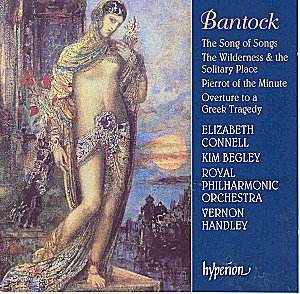This is the sixth of Vernon Handley’s colourful
Bantock albums for Hyperion.
Once again we have music writ large on a heroic,
Late-Romantic (certainly with a capital ‘R’) scale, scored for
a big orchestra and soprano and tenor soloists.
The main work is the Song of Songs conceived
as a ‘Lyric Drama for music in 5 scenes’ and based upon the bible
story of Solomon’s attempts to court a reluctant Shulamite maiden.
Instead of the famous verses proclaimed in cool ecclesiastical
terms here we have an exotic, sensuous, even voluptuous treatment,
with the orchestra in full ‘Richard Straussian’ fervour. Take,
for instance, the orchestral fantasy in the middle of the first
section when the Shulamite maiden dreams ecstatically about her
shepherd lover. Handley’s reading is full-blooded, bringing out
all the detail, the shadings and subtleties of this complex, hedonistic,
fragrant score.
The first - Second Day section opens with the
Shulamite maiden awakening to discover her Shepherd lover outside
Solomon’s palace in which she is being detained by the King. Kim
Begley as the shepherd, his timbre very like Robert Tear, is ardent
in trying to persuade her to ‘Rise up my love, my fair one, and
come away … for lo the winter is past … the singing of the birds
is come and the voice of the turtle (dove) is heard in our land
…’ Elizabeth Connell as the Shulamite is suitably ecstatic at
discovering her shepherd’s presence and darkens her voice dramatically
as she proclaims, ‘Take us the foxes, the little foxes that spoil
the vines: for our vines have tender grapes …’ The Third Day ‘chapter’
that forms the second section is purely orchestral. It is alive
with music of drama and splendour to reflect Solomon’s tempting
of the maiden with gifts, his barely suppressed impatience and
then withdrawal; and tender music for the maiden’s reflections
on her absent lover. The Fifth Day, third section, is set outside
the palace with the lovers reunited. The highlight is their rapturous
duet with those celebrated words – ‘Set me as a seal upon thine
heart … Many waters cannot quench love … For love is strong as
death…’ This duet is delivered by Connell and Begley in the enthusiastic,
florid style prevalent around the period of its composition. Nevertheless
it is hugely enjoyable.
This emphatic ‘Victorian/Edwardian’ delivery
is also very much in evidence in the other Bantock biblical work
here – The Wilderness and the Solitary Place. This is part
6 of a huge work, Christus, that Bantock completed in 700
pages of orchestral score. (He described it as a ‘Festival Symphony
in 10 parts’.) The text is from Isaiah 35, beginning ‘The wilderness
and the solitary place shall be glad for them; and the desert
shall rejoice and blossom as the rose …’ and including ‘Then the
eyes of the blind will be opened and the ears of the deaf shall
be unstopped.’ The orchestral texture is again highly colourful
with harp and tambourine – and cor anglais - very prominent.
Handley gives us a bewitching account of the
popular Pierrot of the Minute. The delicate gossamer fairy
flights – swooping, darting, circling, reminiscent of Berlioz’s
Will o’ the Wisp music contrasts with the awkward
galumphing of the hapless Pierrot anxious for the minute of bliss
offered by the Moon-maiden that is inevitably followed by
his awakening to reality. The love music is rapt
and dreamlike and reminiscent of Bantock’s Fifine.
Finally the Overture to a Greek Tragedy
is another work conceived on a broad heroic canvas, this time
devoted to the latter part of the Oedipus saga in which
Oedipus, blind and exiled, (after he had unwittingly killed his
father and married his mother) is now an old man looked after
by his daughter Antigone. He is taunted by his scheming and feuding
sons. The music is majestic, mysterious and troubled, the battle
scenes exciting and the more tender material associated with Antigone,
captivating. Handley gives it a sizzling reading; but for all
its strengths, there are languors, some judicious editing might
have helped. Tchaikovsky’s influence is marked.
Full-blooded, romantic readings of more exotic
Bantock. For those who have been collecting this marvellous hedonistic
Hyperion series, this sixth album will not disappoint.
Ian Lace
